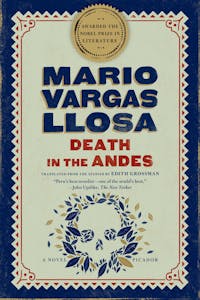Death in the Andes
A Novel
 Download image
Download image
ISBN10: 0312427255
ISBN13: 9780312427252
Trade Paperback
288 Pages
$19.00
CA$25.00
In a remote Andean village, three men have disappeared. Peruvian Army corporal Lituma and his deputy Tomás have been dispatched to investigate, and to guard the town from the Shining Path guerrillas, whom they presume are responsible. But the townspeople resent and mistrust them, and Lituma is baffled by their mystical practices as well as by reports of violent deaths nearby. To pass the time, and to cope with their homesickness, Tomás entertains Lituma nightly with the sensuous, surreal tale of his precarious love affair with a wayward prostitute. Evocatively intermingling the corporeal and the spiritual, a suspense story and political allegory, Mario Vargas Llosa offers a panoramic view of contemporary Peru.
Reviews
Praise for Death in the Andes
"People have been mysteriously disappearing in the remote mining communities of the Andes, where the inhabitants are more likely to speak the Incan language Quechua than Spanish. Some blame the heavily armed bands of teenage Sendero Luminoso guerrillas that periodically descend on the villages to conduct mock trials and execute 'imperialist lackeys.' Others blame the equally bloodthirsty government troops. Danish anthropologist Paul Stirmsson suspects that some of the recent victims may have been killed in ritual sacrifices to appease pre-Columbian gods and demons. A witch named Dona Adriana and her husband, Dionisio, whose drunken antics recall the Dionysian revels of Greek antiquity, are the prime suspects. The author (In Praise of the Stepmother) makes no attempt to assess the Senderistas in political terms. Instead, he offers a sort of Diane Arbus portrait gallery of rural Peru, set in an entertaining detective novel format."—Edward B. St. John, Loyola Law School Library, Los Angeles, Library Journal
"Ancient and modern horrors mingle in Vargas Llosa's somber yet oddly zestful novel, the most direct examination the Peruvian writer has made of his nation's complex political problems since The War of the End of the World and The Real Life of Alejandro Mayta. At a remote location in the Andes, Civil Guards Lituma and Carreo investigate the disappearance of three men, two of whom were laborers on a highway project that will likely never be finished due to the region's increasing political volatility. Sendero Luminoso guerrillas have attacked several nearby towns; in a chilling early chapter, they stone to death two French tourists unwise enough to travel through the area. The Sendero Luminoso's activities—and Carreo's casual aside acknowledging that the Civil Guard has committed atrocities in return—create an atmosphere of menace that is further compounded by the officers' inability to communicate with the sullen and hostile seruchos. These mountain people treat the easygoing Lituma 'as if he came from Mars.' Indeed, affluent coastal Peru might as well be Mars to the sierra's impoverished Indians, who prove less receptive to the guerrillas' Marxist sloganeering than to the blandishments of a mysterious local couple who may have instigated sinister rites with links to those involving pre-Columbian human sacrifice . . . [Vargas Llosa's] vigorous storytelling and intriguingly complex structure—past and present mingle in the intertwined narratives of various characters—offer ample satisfaction."—Publishers Weekly
Reviews from Goodreads
About the author
Mario Vargas Llosa; Translated by Edith Grossman
RELATED
Read Articles by the Author at the Guardian
How I Lost My Fear of Flying: FSG Work in Progress essay by Vargas Llosa



